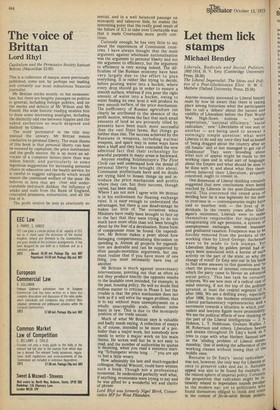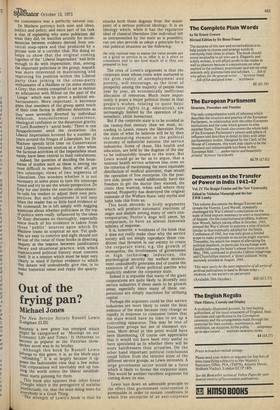Let them lick stamps
Michael Bentley
Liberals, Radicals and Social Politics, 1892-1914, H. V. Emy (Cambridge University Press, £6.50)
The Liberal Imperialist: The Ideas and Polltics of a Post-Gladstonian Elite H. W. C. Mathew (Oxford University Press, £5.50) Anyone remotely interested in Liberal historY must by now be aware that there is taking place among historians what the participants like to call a 'debate' about the nature and viability of Liberalism before the First World War. High-flown notions — 'socialimperialism,' national efficiency,' social radicalism,' 'new' ' Liberalisms of one sort or another — are being used to answer a seemingly simple question: what were Liberals to do and say once they had sickened of 'being dragged about the country after an old lunatic' and at last managed to get rid of Gladstone? They were brooding about what sort of appeal might be made to the working class and in what sort of language;• about the Empire and what should be seen to be done with it; and about what they themselves believed their Liberalism, properlY conceived, ought to consist in. •
One dimension of Liberal thinking certainly suggested that new conclusions were being reached by Liberals in the post-Gladstonian world. This concerned the vexed area of deciding how far it was legitimate tor the state to intervene in — contemporaries might have said to interfere with — the lives of dividuals. In the twenty years after Gladstpne's retirement, Liberals were to make themselves responsible for legislation inaugurating old age pensions, a system of unemployment exchanges, national insurance and graduated taxation. Fourpence was to be forcibly removed from the pockets of the working class by Lloyd George; duchesses were to be made to lick stamps. yet Liberalism during its golden period had always been associated with a horror of such activity on the part of the state: so why the change of mind? Dr Emy sets out in his book to find some answers to this question and 'to chart the process of internal conversion by which the party came to favour an advanced social policy. This last task he certain'); achieves. We see new men of a radical cast of mind entering, if not the top of the political pyramid, at least the central segment of it after 1892. We see a drifting away, especiallY, after 1906, from the business orientation 01 Liberal parliamentary representation and movement towards a situation in which journalists and lawyers figure more prominentlY• We see the political effects of new thinking 00 the part of the Liberal intelligentsia — J. Hobson, L. T. Hobhouse, Graham Wallas, J. M. Robertson and others. Liberalism heaves and strains throughout Dr Emy's book as it tries to cope with what Herbert Samuel saw as the 'abiding problem of Liberal statesmanship,' that of seeking the adherence of the working classes without losing that of the Middle ones.
Recourse to Dr Emy's 'social radicalism was not, however, the only way for Liberals at once to preserve cake and eat it. Suitable appeal was also to be found for example, in the related sphere of imperial policy. CertainlY the proposition that radicalism might be intimately related to imperialism sounds peculiar to the modern ear; yet to politicians who found themselves obliged to think and orate in the context of fin-de-siecle British politics, the consonance was a perfectly natural one. Dr Mathew portrays both men and ideas, Politics and policy; and since part of his task is that of explaining why some politicians did What they did, he watches acutely for inconsistencies between evidence derived from oratorical soap-opera and that produced by a Private note or a corridor chat. His doing so helps to show that the original coming together of the ' Liberal Imperialists ' had little enough to do with imperialism; that, among the important politcians in the group, Asquith Was more interested in maintaining and improving his position within the Liberal Party than joining in the cross-party enthusiasms of a Haldane or (in some moods) a Grey; that events conspired to set in motion an infatuation with Milner on the part of the ' Limps' which was to prove a political embarrassment. More important, it becomes plain that members of the group spent much of their time facing in different directions as they were severally diverted by individual ambition, nonconformist conscience, Ideological confusion or the disastrous gravity of Lord Rosebery's 'astral body.' There is one disappointment amid the revelation: the Liberal Imperialists hovered for a number of Years around the fringes of Liberalism, but Dr Mathew spends little time on Conservative and Liberal Unionist sources at a time when the factious activities of the Imperialists must surely have been central to their calculations. Indeed, the question of deciding the boundaries of studies such as these is among the most difficult to resolve. Here, after all, are two telescopic views of two segments of Liberalism. One wonders whether it is not necessary at some point to turn the telescope round and try to see the whole perspective. Dr Emy for one thinks the exercise unnecessary: he tells his readers to adjust their own perspectives. But such adjustment is not easy When the reader has so little hard evidence at his command; he is left simply with nagging questions about whether politicians at the top of politics were really influenced by the ideas Dr Emy discusses so thoroughly, especially since much of his evidence is taken from those ' public ' sources upon which Dr Mathew trains so sceptical an eye. Yet quibbles are easy to contrive and sight should not be lost of the value of these books in directing inquiry at the tension between justificatory theory and situational practice, with which Sophisticated political history must concern Itself. It is a tension which must be kept very Clearly in mind if further evidence to which this debate will undoubtedly give rise, is to Make historical sense and repay the quarrying.



































 Previous page
Previous page